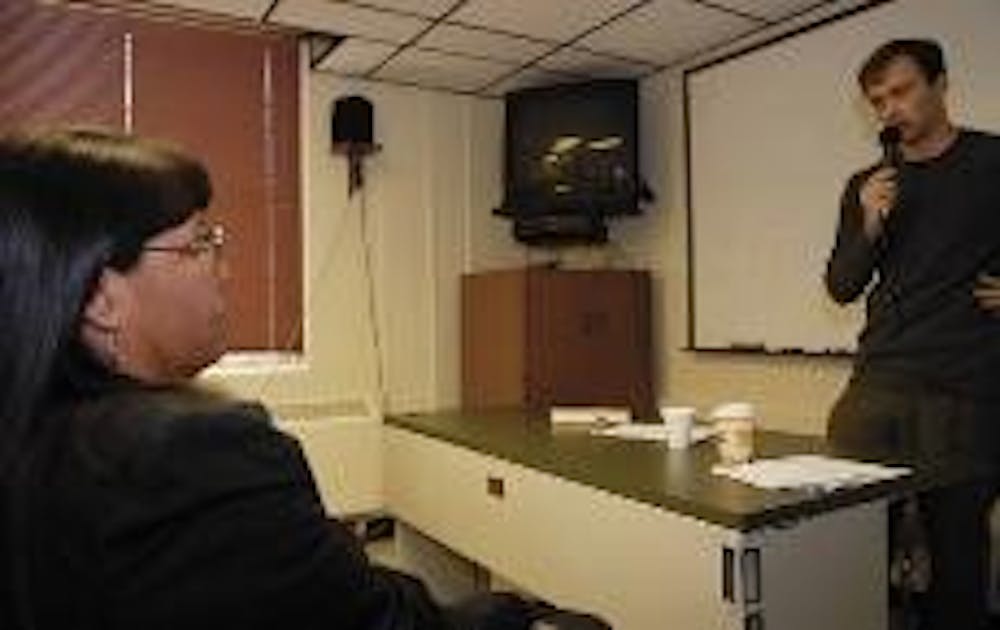by Jeremy Hunt
Daily Lobo
Steve Hendricks said he had to sue the FBI to get information for his book about the agency's involvement in the oppression of American Indians.
"In three-quarters of it, I'm bashing the federal government," he said. "The story I wanted to tell was what the FBI had done to Indians."
Hendricks, an investigative reporter and author, wrote The Unquiet Grave: The FBI and the Struggle for the Soul of Indian Country. The book focuses on the American Indian Movement, an organization for the protection of American Indian rights.
Get content from The Daily Lobo delivered to your inbox
Hendricks spoke at Mesa Vista Hall on Tuesday.
The FBI told Hendricks the information he requested came from informers, and it would violate their privacy and the privacy of the individuals they spied on, he said.
Hendricks said he sued the FBI under the Freedom of Information Act to get files about incidents regarding the FBI and American Indians.
Hendricks said he had a difficult time with the judges as well.
"Judges live in awe of the FBI," he said. "The burial of this information is as important as the burial of the movement."
The book explores the incidents at Pine Ridge Reservation, where the FBI and Bureau of Indian Affairs helped tribal president Dick Wilson oppress the population and stay in power.
"The Bureau of Indian Affairs allowed Wilson to be corrupt and steal money," he said.
The American Indian Movement focused its energy at Pine Ridge Reservation in South Dakota in the early 1970s, because it was the poorest part of the country and was facing political oppression, Hendricks said.
Wilson responded to the organization's presence by making it illegal for more than three people to gather at once, anywhere on the reservation, he said.
Wilson hired "goons," men who would intimidate, attack and murder activists from the organization and anyone who stood against him, Hendricks said.
He said the Bureau of Indian Affairs backed Wilson, because he brought in money by allowing white ranchers to buy land on the reservation.
Hendricks said members of the American Indian Movement appealed to the FBI and Bureau of Indian Affairs to investigate beatings by Wilson's "goons." Most of the cases were never investigated, and of the ones that were, none were solved, he said.
Getting nowhere with the FBI and Bureau of Indian Affairs, members of the organization tried to get the U.S. Attorney's Office to prosecute the beatings, but it refused, he said.
"Nearly every legal avenue they went to was chopped off," he said.
Members of the organization and tribe began to try to have Wilson impeached, he said.
After a movement began to get him impeached, the FBI and U.S. attorney set up offices in Pine Ridge to thwart the dissenters' efforts, he said. The FBI infiltrated meetings to have Wilson impeached and provide activists' information to the U.S. Attorney's Office, he said.
The office would prosecute people who attended the meetings, he said.
Wilson defeated the impeachment process, he said.
Hendricks said his research was based on files the FBI made while oppressing American Indians.
"This book is a product of documents," he said. "This was clearly not an FBI looking out for activists."
Mary Bowannie, a lecturer at Native American Studies, said Hendricks' work is important.
"This particular issue is always a controversial topic," she said. "Native Americans and our relationship with the U.S. government has not always been pretty."
Bowannie said the lecture was good for students.
"There's a lot for students to learn from him about accessing public information," she said.
Student Amy Vigil said she came to the lecture because she is American Indian and wants to work for the FBI.
"It brings true light to the FBI and the government in general," she said. "It's great he's a nonnative and bringing light to native issues."






